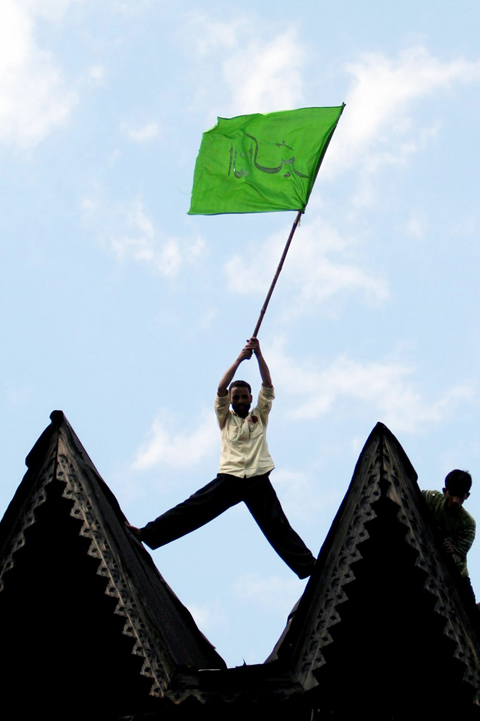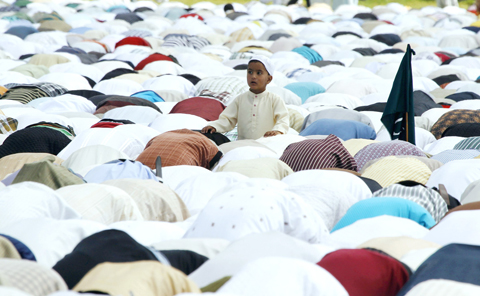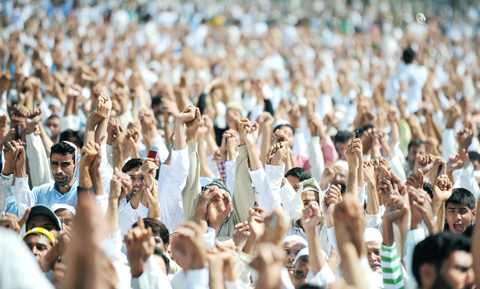India deployed thousands of security forces and slapped an indefinite curfew on Kashmir’s summer capital yesterday a day after Muslims set fire to public buildings in protests against New Delhi’s rule, officials said.
The government has been trying to respond to the biggest separatist demonstrations in two years in Kashmir triggered by the killing of a 17-year-old student by police in June. Seventy people have died in the ensuing protests, most from police firing into protesters.
Troops equipped with assault rifles patrolled deserted streets and blocked off lanes with razor wire and iron barricades in Srinagar, the heart of an insurgency where tens of thousands of people have been killed in two decades of violence.

PHOTO: EPA
The curfew extended to other big towns in the Kashmir valley.
Jammu and Kashmir Chief Minister Omar Abdullah told NDTV news channel that the fresh violence in Muslim-majority Kashmir had dealt a setback to an anticipated new government peace initiative.
“Such protests create problems for everybody else,” Abdullah said. “How can you take this move forward if violence continues?”

PHOTO: REUTERS
Police have accused the region’s main separatist leader, Mirwaiz Umar Farooq, of instigating violence and arson. Farooq denied the charges.
After Eid al-Fitr prayers to mark the end of the Ramadan fasting month, tens of thousands marched through Srinagar on Saturday, setting fire to government and police buildings. Farooq led the main demonstration.
Killings of civilians have fueled anger across Kashmir, where sentiment against New Delhi’s rule runs deep. Human rights groups say India’s Armed Forces Special Powers Act, which gives security forces wide powers to shoot, arrest and search in battling a separatist insurgency, further alienates people.

PHOTO: AFP
India’s Congress Party-led federal government is considering a partial relaxation of the act in Kashmir as part of a peace initiative expected in the next few days. However, no consensus has been reached on the issue yet, local media have reported.
“We don’t want peace, we don’t want the peace of a graveyard,” Farooq said in a statement. “We want a solution of the Kashmir dispute and that will end all the problems.”
Peace in Kashmir is crucial for improving relations between India and Pakistan, which are trying to revive peace talks halted after India blamed Pakistan-based militants for the 2008 Mumbai attacks.
The neighbors claim Kashmir in full though they rule it in parts and fought two of three wars over the region.
After leading a special prayer on Saturday, Farooq is said to have asked worshippers to march in Srinagar. Carrying green flags, thousands of people chanted: “We want freedom. Go India, Go Back.”
Demonstrators later attacked and torched a building housing the offices of the state police and the electricity department, the police officer said.
“This is the first time that an Eid congregation has been converted into a protest,” police said in a statement.
Syed Ali Shah Geelani — a key leader of the All Parties Hurriyat Conference, an umbrella organization for separatist groups espousing nonviolent struggle — demanded that India accept Kashmir as a disputed territory, withdraw hundreds of thousands of troops and release all political prisoners as a precondition for peace talks.
The Indian government did not respond to the demands.

FRAUD ALLEGED: The leader of an opposition alliance made allegations of electoral irregularities and called for a protest in Tirana as European leaders are to meet Albanian Prime Minister Edi Rama’s Socialist Party scored a large victory in parliamentary elections, securing him his fourth term, official results showed late on Tuesday. The Socialist Party won 52.1 percent of the vote on Sunday compared with 34.2 percent for an alliance of opposition parties led by his main rival Sali Berisha, according to results released by the Albanian Central Election Commission. Diaspora votes have yet to be counted, but according to initial results, Rama was also leading there. According to projections, the Socialist Party could have more lawmakers than in 2021 elections. At the time, it won 74 seats in the

EUROPEAN FUTURE? Albanian Prime Minister Edi Rama says only he could secure EU membership, but challenges remain in dealing with corruption and a brain drain Albanian Prime Minister Edi Rama seeks to win an unprecedented fourth term, pledging to finally take the country into the EU and turn it into a hot tourist destination with some help from the Trump family. The artist-turned-politician has been pitching Albania as a trendy coastal destination, which has helped to drive up tourism arrivals to a record 11 million last year. US President Donald Trump’s son-in-law, Jared Kushner, also joined in the rush, pledging to invest US$1.4 billion to turn a largely deserted island into a luxurious getaway. Rama is expected to win another term after yesterday’s vote. The vote would

CANCER: Jose Mujica earned the moniker ‘world’s poorest president’ for giving away much of his salary and living a simple life on his farm, with his wife and dog Tributes poured in on Tuesday from across Latin America following the death of former Uruguayan president Jose “Pepe” Mujica, an ex-guerrilla fighter revered by the left for his humility and progressive politics. He was 89. Mujica, who spent a dozen years behind bars for revolutionary activity, lost his battle against cancer after announcing in January that the disease had spread and he would stop treatment. “With deep sorrow, we announce the passing of our comrade Pepe Mujica. President, activist, guide and leader. We will miss you greatly, old friend,” Uruguayan President Yamandu Orsi wrote on X. “Pepe, eternal,” a cyclist shouted out minutes later,

Myanmar’s junta chief met Chinese President Xi Jinping (習近平) for the first time since seizing power, state media reported yesterday, the highest-level meeting with a key ally for the internationally sanctioned military leader. Senior General Min Aung Hlaing led a military coup in 2021, overthrowing Myanmar’s brief experiment with democracy and plunging the nation into civil war. In the four years since, his armed forces have battled dozens of ethnic armed groups and rebel militias — some with close links to China — opposed to its rule. The conflict has seen Min Aung Hlaing draw condemnation from rights groups and pursued by the